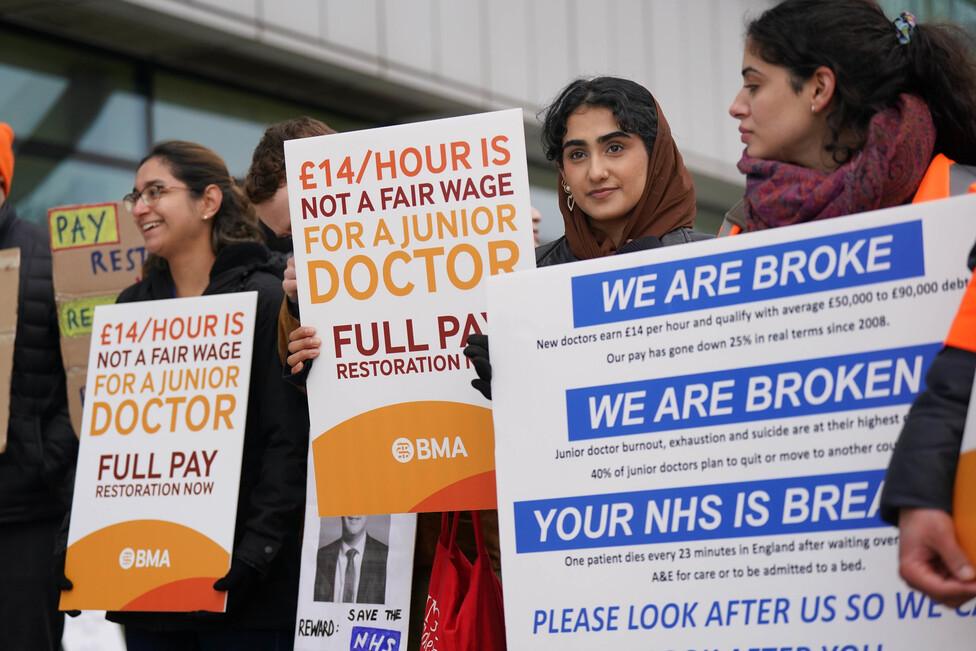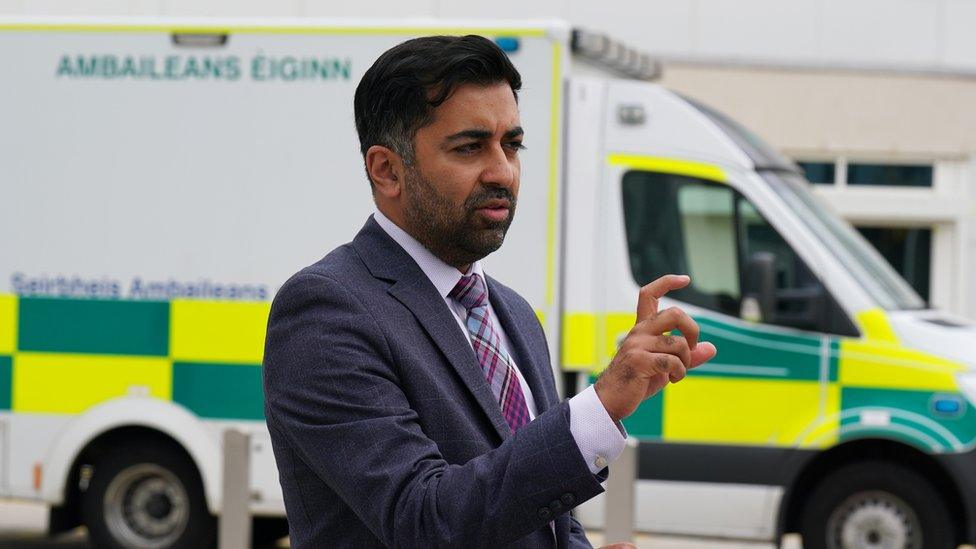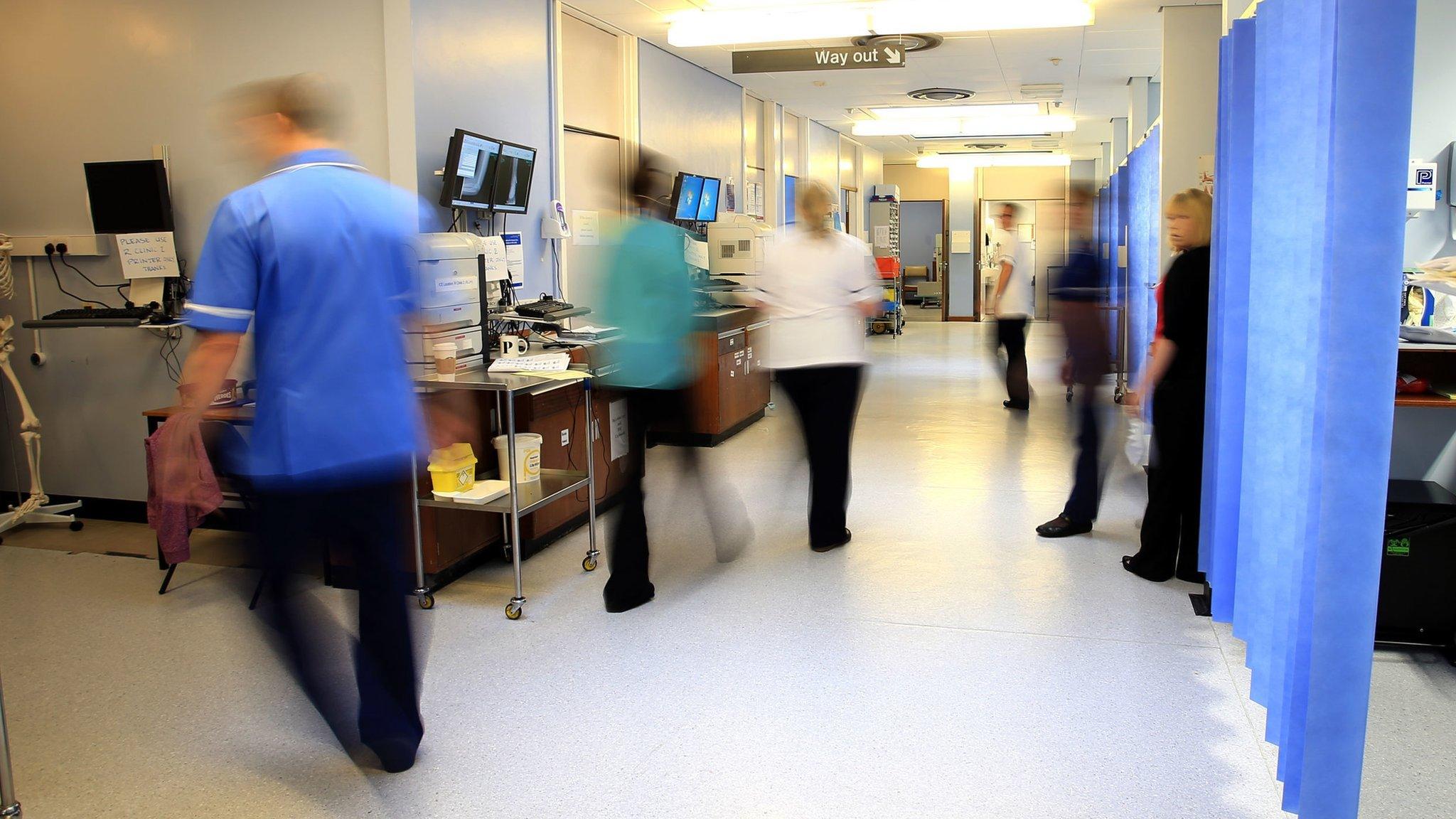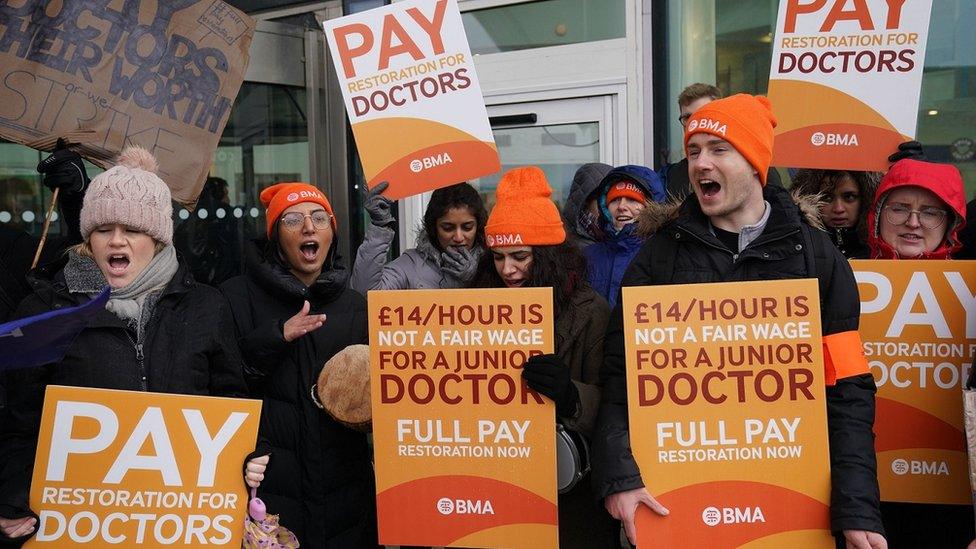Junior doctor strike ballot opens amid pay dispute
- Published

Junior doctors recently went on strike in England
A strike action ballot of junior doctors in Scotland has opened amid a dispute over pay with the Scottish government.
They will vote on whether to walkout for 72 hours, after junior doctors in England took part in a three-day walkout earlier this month.
The ballot will run for just over five weeks and close on 5 May.
BMA Scotland said pay awards for junior doctors in Scotland had delivered real-terms pay cuts of 23.5% since 2008.
It added that with inflation continuing to rise, this year's 4.5% uplift "is again being outstripped and the position on pay erosion will be worse by the end of the year".
But the Scottish government said the pay demands were "simply unaffordable" unless cuts were made to the NHS and other public services.
BMA's Scottish junior doctors committee chairman Dr Chris Smith said some junior doctors in Scotland were earning a basic salary that equated to about £14 an hour.
He said: "Over recent months we have tried, repeatedly, to encourage the Scottish government to engage with us in meaningful and formal negotiations over full pay restoration and they have repeatedly refused to commit to this.
"I know junior doctors in Scotland are not only exhausted and on their knees but are increasingly angry and frustrated - I share those sentiments. This ballot gives us the chance to finally have our voice heard loud and clear.
"Enough is enough - junior doctors in Scotland are not worth almost a quarter less than our 2008 counterparts."

'I can't afford living in the system anymore'
Junior doctor Tiffany Li does not believe current salaries are sustainable
Tiffany Li is a junior doctor in her second year of the foundation programme at NHS Lothian after completing a degree in medicine at the University of Dundee.
She told BBC Scotland she had considered moving to Australia for better pay and conditions.
She said she knows others in the Scottish health service, including nurses, doctors and physiotherapists, who were considering doing the same.
"We constantly lack staff, we are running maybe at least three staff down on each day," she said.
"So you just have to cover for the gaps on the rota which means that one person is doing two doctors' jobs and it's not very safe.
"We're going into work knowing that the pay is very low and we're constantly worrying about other kinds of financial needs that we need to fulfil when we're back home.
"I think physically and mentally we are exhausted."
Ms Li added: "I'm constantly worried about the state of it [the NHS] every single day. You look at the ward, you look at A&E, it's just a warzone every single day. And it's not sustainable and it's not safe."
She told BBC Scotland she believed her pay did not fairly reflect the responsibilities involved in her job.
"I think if we're talking about full pay restoration, I will see my hourly rate going from maybe 16 to 19 quid, which is not a lot," she said.
"But I think in terms of morale, it would at least make me feel that the government actually cares and [is] committed to keeping doctors in the country."
She added: "I like the NHS, it's just pay and the working conditions are just so bad that I can't afford living in the system anymore."

Dr Chris Smith said some junior doctors were actively looking at exit plans and posts overseas for better pay and conditions.
He said: "This is the Scottish government's last chance to engage with us positively, with respect and recognising our concerns about how poor pay is impacting on the workforce, retention of doctors and therefore the care the NHS can provide.
"I urge the new cabinet secretary for health to make this their number one priority if they want to avoid disruptive strike action, which is almost certainly coming if they continue their current approach.
"And I urge my junior doctor colleagues across Scotland to vote in our ballot and add their voice to our Scottish fight for full pay restoration."

Former Health Secretary Humza Yousaf has said the BMA's pay demands were unaffordable
A Scottish government spokeswoman said the health secretary offered to meet the BMA to discuss pay concerns at the end of February.
The spokeswoman said: "We've been clear their demands for an above retail price index pay increase, plus an additional ask of 23.5% - meaning a pay raise of more than 35% - are simply unaffordable.
"In Scotland junior doctors have already been awarded a 4.5% pay uplift for 2022/23 recommended by the independent Doctors' and Dentists' Pay Review Body and we are disappointed this ballot will go ahead as industrial action would be in no-one's interests."
The spokeswoman said the government had written to the independent Doctors' and Dentists' Review Bodies asking for a "separate and specific" recommendation for junior doctor pay.
She added: "We been very open about the real fiscal challenges we face, have explored all options for 2022/23 and there's no additional money for pay without cutting funding to the NHS and other public services."
Related topics
- Published9 December 2022

- Published17 March 2023
